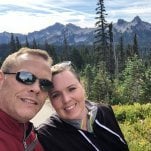Search the Community
Showing results for '공주출장업소《카톡: po03》{goos20.c0m}출장최고시외국인출장만남Y╅┺2019-01-19-10-35공주╩AIJ↸출장업계위콜걸출장마사지콜걸강추✍외국인출장만남➴릉콜걸샵☪공주'.
Found 17,501 results
-
Starting Date: 10/31/17 Starting Weight: 333 lbs Surgery Date: 2/22/18 Current Weight: 212 lbs NSV: Too many to list
-
May be best to check with your doctor or nutritonist to see if you can progress. Have you tried having yoghurt instead? I have been thinning out yo pro yoghurt as part of my post op diet which I finish in about 10 days.
-
Hi and Welcome I don't have any recommendations for protein shakes but hopefully someone may, but have you tried things like collagen powder, some are quite high in protein and can be mixed with various liquids or soups. I am still in the free fluid stage for another 10 days or so, in place of a shake sometime I have been having some yo pro yoghurt thinned down with some water or skim milk.
-
Surgery date 10/8 , down 16lbs. I hit the dreaded 3 week stall this week but the scale finally moved today. I have a total food aversion to chicken. I'm cleared to eat it but I feel horrible after doing so... nauseous, gassy and in pain. Even when its soaked in gravy. I was trick or treating last night with my kids and drinking water while walking. Strangely enough, water went down super easy while walking. I'm sure it was because I was mobile, but I might try to take a bottle of water on a walk now and kill 2 bbn birds with 1 stone. Sent from my SM-G960U using BariatricPal mobile app
-
I had the gastric sleeve on 10/16. My doctor wants his patients to do 3 weeks liquids, 3 weeks soft food, then starting week 7 is normal food. I am 5 days from soft food stage. I however have been struggling to get my protein in because I can't do the protein shakes or powder. I have seriously tried every kind every which way and still have issues. I know some people get to start the soft foods at 2 weeks. If I started early with lunch meat, tuna, retried beans, would that be OK or would it be a big no no. My doc wants me to get 65 grams of protein and its hard to do when I can't do the protein shakes and powder. Right now I'm eating yogurt too try to get some in. The doc approved yogurt, pudding, cream soups on the full liquid diet. Any advice would be appreciated. Sent from my SM-G960U using BariatricPal mobile app
-
Had my final meeting with the surgeon. Surgery scheduled for November 19. Waiting on final approval from insurance. This is getting real, but I'm ready for this next phase in my life.
-
your pouch is roughly the size of a banana. Having difficulty with fluids is not uncommon. I'm 10 weeks post and water flavor, texture, and temperatures are a constant belly battle. I can say it's all trial and error and just don't give up. The pain could be gas, if it's the incision port itself, it will take a minute to heal as most likely that's where your belly was removed. The pain eases in about 2 weeks. Congratulations and good luck
-
OMG, I'm going through a similar thought pattern at the moment. My surgery is not until early Feb 2019 and I first met my surgeon in August 2018 so I've had all this time to relax and not worry about dieting. On the other hand I've gained about 5kgs since then and I've got to get through Christmas and New Years yet. I will be starting a pre-op diet on the 21st January 2019 but I'm worried that I'm going to blow up to the size of a house before then. I have my first appointment with my dietitian in a couple of weeks and I'm just wondering... do they ask you to lose x amount of kilos from the day you see your dietitian or do they just ask that you lose for example 5 kgs from whatever you are at the start of your pre-op diet? I guess they are all different but I'm worried they want me to lose the weight from when i first saw my surgeon in August which was 5 kgs ago 😕
-
For the first 2 1/2 months I could only drink small sips of water every 10 mins. Now I'm at 3 months and I can drink water a little quicker, but I'm still not able to drink a full 8 ounces at once.
-
I had a band for 10 years, no loss but had all the vomiting problems if the food was too dry or too fast or whatever it would go out... so I decided and removed it and changed to sleeve, only have it for three weeks but I am already much happier than before. My doctor wanted to have a month+ difference from the day he removed it to the day of the sleeve... I was feeling super hungry these days but managed through quite well and lost 20kilos before my sleeve surgery (in three months time) plus 6 more now after the sleeve. My opinion is to avoid lapband and go for sleeve
-


October 2018 Sleevers
ElectricBoogaloo replied to kdiddle31's topic in Gastric Sleeve Surgery Forums
My surgery weight on 10/10 was 210.8 and my discharge weight was 218.4😒. Today (3 weeks po), I weighed in at 195.8. I have been able to drink 64 ounces and get in 60 grams of protein from the first day I returned home...which led me to believe that I had a placebo sleeve!😂 Once I started soft foods, I quickly realized that a majority of my stomach was no longer there. I would say the best thing that has happened to me since surgery was the ability to...😊SLEEP ON MY STOMACH AGAIN!!!!😊 -
It's the 31st! Pretty soon, all of us October sleevers will be post-ops! Congratulations to all of us! ❤️ If people are looking for stats to compare to (though you shouldn't, for your own sanity; it's all so variable and so individual!), my surgery weight on 10/3 was 312.8, and I'm at 299.0 today, exactly 4 weeks later. Low to moderate, especially for starting out over 300. I expect I'd have done better if I'd managed to get more liquids in--we really need that extra hydration to lose the weight. But it's still pretty great--more than 10 pounds a month is a really mind-blowing amount of weight to lose, without feeling constantly hungry and dizzy. (At least, that's how I felt, every time I've lost that much weight in a month, before now.) And also without avoiding carbs like they are death ... I had (low sodium) chicken noodle soup last night.* Refried beans have been a significant part of my diet, as well. My team clears people to do ... uh, pretty much everything, as I understand it: lifting weights, swimming, and so on, after a month. I think that means I'm good after Saturday (11/3), but my one month appointment isn't until 10 days later. So I might try to be patient, we'll see. *Noodles are only OK this soon if they come in a soup like that, and even then, only if your team says they're OK. You don't want them swelling up in your tummy. Soup noodles are as swelled as they're going to get, so different teams vary on whether they allow them or not.
-
First Bariatric surgery, yes. They pushed me to walk as much as possible. It did help to get some of the air out. I’m down 13 lbs since 10/10. 103 to go. :) Where do you live? You are a badass for continuing to work in doing what’s best for your health!
-
Congratulations on your surgery date! I still have a few steps to complete before my claim (? I think that's what it may be called) is submitted to insurance for approval, but if all goes well, I am looking at a surgery date of mid to late January 2019.
-


Need help week 5
blackhawkpro replied to Meggie1111's topic in POST-Operation Weight Loss Surgery Q&A
At five weeks I was plain yogurt and berries in the morning, chewable vitamins only or go to the patch. Broth, cottage cheese, string cheese. Water, water, water ! Sleep, rest heal, don’t worry. Everything will be fine. I’m at 7 months, 149 lbs. down and feeling like a million dollars, riding a bike 10 miles every day. I had major hernia surgery at the same time as my bypass Bariatric surgery. I was a mess. You will be fine, get your stomach right and everything else will follow. -
We have had to leave our beloved mini Schnauzer a few times when we take a cruise or a motorcycle trip. The longest we have been gone so far is 10 days. Our friend who owns and operates the kennel literally sends us a text update with a picture or short movie of Bella every day. She loves it there which makes it easier but I do miss her very much. The first time I took her I burst into tears as I was leaving so my husband takes her now. I don't know if you are familiar with The Dog Whisperer (Cesar Millan) but he states that dogs do not really have a concept of time and one day or ten days is the same for them. She is always super excited for about 5 minutes then back to normal so I hope he is right. She also gets super excited when I come home from the grocery store...
-
So I got sleeved 10/25/18. It went really well!!! Doctor said my liver was perfect and I was actually released same day!!!! But today I went back to work , which I work at a desk so its not aggressive or anything however I've been getting this great pain in my back. The same side that the larger incision was made so I don't know if its normal or not? Also. It hurts to drink water. I've tried it room temp and cold. Its so hurty lol. I am drinking PowerAde Zero however doctor said it was fine but I was curious if others had a water problem? Or am I just being a baby lol Thanks for listening!
-
2 of my incision sites are super sore and swollen. Dr. Said it was area they worked in the most, ouch. Other than that, im progressing as expected. I was sleeved 10/24 Sent from my SM-G965U using BariatricPal mobile app
-


Forbes: Why high protein diets may be linked to Cancer
Creekimp13 replied to Creekimp13's topic in Rants & Raves
https://www.forbes.com/sites/alicegwalton/2014/03/04/the-protein-puzzle-meat-and-dairy-may-significantly-increase-cancer-risk/#749e74c058b7 This research describes a "high protein diet" as being a diet with 20% of total calories coming from protein. Since most bariatric patients fit this profile, it is worth reviewing and discussing with your doctor. This is particularly important as you move to maintenance. Why High-Protein Diets May Be Linked To Cancer Risk Alice G. Walton Despite the popularity of protein-rich diets like Atkins and Paleo, new research suggests that it may be wise to steer the opposite way, especially when it comes to cancer risk. In the new study, middle-aged people who ate protein-heavy diets had a markedly increased risk of dying from cancer compared to their low-protein counterparts. But, as always, there are caveats: Protein from animal sources – meat and dairy – was what largely produced the risk, whereas plant-derived proteins seemed to be “safer.” And the rules seem to be different for people over the age of 65. So what are we to do? "There's a misconception that because we all eat, understanding nutrition is simple,” said study author Valter Longo, director of the Longevity Institute at the University of Southern California. “But the question is not whether a certain diet allows you to do well for three days, but can it help you survive to be 100?" In the new study, the team followed over 6,300 adults over the age of 50, to see what effect high-, medium-, and low-protein diets had on longevity. A high-protein diet was defined as 20% of one’s daily calories coming from protein, a moderate-protein diet is made up of 10-19% calories from protein, and a low-protein diet consists of less than 10% protein. People in the study ate, on average, 16% protein, with two-thirds coming from animal sources – pretty typical of an American diet, the authors say. The findings were intriguing: People from ages 50-65 who ate high-protein diets were four times more likely to die of cancer – this is in the ballpark of smoking risk, say the authors – compared to people who ate low-protein diets. Even those who ate moderate-protein diets were three times as likely to die from cancer. And people who ate high-protein diets were 75% more likely to die from any cause, including three times as likely to die from diabetes. The team calculated that reducing protein intake from moderate to low would reduce the risk of death by 21%. Interestingly, when the source of the protein was taken into consideration, things changed a bit. When animal-derived sources taken out of the mix, the mortality risk was significantly reduced: In other words, plant-based protein did not seem to present the same kind of problem as protein from animal sources."The majority of Americans are eating about twice as much proteins as they should, and it seems that the best change would be to lower the daily intake of all proteins but especially animal-derived proteins," said Longo. "But don't get extreme in cutting out protein; you can go from protected to malnourished very quickly." Why the protein-cancer connection? Protein intake influences the levels of the growth hormone IGF-I, which not only affects the growth of healthy cells, but can also encourage cancer cell growth. In fact, in the current study, the team found that for every 10 ng/ml increase in IGF-I, people who ate high-protein diets were 9% more likely to die from cancer than those on a low-protein diet. This growth hormone mechanism seems to be the reason that calorie-restricted diets have been shown to increase longevity in certain species, including, possibly, humans. But again, there are more caveats. IGF-I levels decline over the years, especially after age 65, which is part of the reason that people lose muscle tone and become frailer with age. And the current study bore this out, too: When the team looked at people above the age of 65, people who ate more protein had a reduced risk of death. The protein issue is therefore complex, and will require some more research. But the recommendations arising from the current study, says Longo, line up with those from the World Health Organization and the Institute of Medicine. Longo tells me that generally people should stick with “plant based proteins and/or stay as close as possible to 0.36 grams of protein per pound of body weight per day. This is about 54 grams of protein per day for a 150-pound person… However, going lower than that can be detrimental.” So, it may be wise to watch your protein intake, at least in middle age. And at any age, eating a plant-based diet is probably smart, as study after study shows the near-indisputable health benefits of doing so. "Almost everyone is going to have a cancer cell or pre-cancer cell in them at some point,” says Longo. “The question is: Does it progress? Turns out one of the major factors in determining if it does is protein intake." -
Hello everyone! I joined the site yesterday and posted in the General Discussions, but thought that I would also introduce myself here since I am working towards bypass surgery. A little about me - I am 29 years old. I was an athlete my entire life, through college. After college, I stopped working out and stopped watching what I ate, and gained almost 200 pounds in about 8 years. I finally went to a primary care doctor in August, and he thought I may have a medical issue and that's why I gained so much weight. He ordered many tests and everything came back great, he said that I am fortunate to have great genes! He recommended weight loss surgery and sent me for a consultation. I went for my consultation and decided that the sleeve would be my best option. I began the process: started my nutrition classes, passed my heart clearance, passed my psychological evaluation, then went for what the surgeon thought would be a routine endoscopy on October 9th. When my surgeon received the pathology results from two biopsies he took during my endoscopy, he realized that I have Barrett esophagus. Due to this diagnosis, I am not able to have the sleeve surgery and will instead have gastric bypass. Because of the new surgery option, I will be having the surgery at a hospital and not at the previously planned surgery center. Also because of this, I now have to do everything through the hospital. This past Monday, I had my first nutritionist appointment there (they are counting my first one from the surgery center, so I have two completed). I am scheduled to have two more, one in November and one in December. The scheduler at the hospital also said that they do their own psychological evaluation, and will not use the one I previously had done. If all goes according to plan, I will be having surgery mid to late January 2019. I did a lot of research about the sleeve, but am still learning about gastric bypass. I am so sorry for the long post but just wanted to give an explanation of how I got to this point! I look forward to hearing about everyone's different experiences and learning more about weight loss surgery.
-
Have you done a "reset" yet? Pretty much just "start over", start a 2 week pre-op diet, then fast for the 2 days when you would have "surgery" then start up a post-op diet process again. Have you had any skin removal yet? If not, that could be where your weight is getting stuck, if you've reduced your fat content to a level that's low, yet still are 10-20 lbs over what you feel you should be, it could be extra skin.
-


For those who had temporary "buyers remorse"
CrankyMagpie replied to Rexcom's topic in Gastric Sleeve Surgery Forums
I have little flashes of it, I guess? (Sleeved 10/3/18.) When I was still miserable, post-op, was probably the worst. I didn't have the full-on "what have I done to myself?" reaction that a lot of people describe, but I was definitely having some feelings, not too many of them positive. I was only really miserable for maybe two days after surgery day, though, and the feelings receded quickly. Now I'll think about wanting to have a croissant, or something I enjoy, and be a little sad I can't. (I know that I will probably be able to have a bite or two of any treat I want again in the future, and some of those treats won't even be all that appealing, so it's really only a little sad. Certainly not sad enough to risk it so early, right?) Or I'll think about the future and about how there's a good chance I'm going to have trouble "blending in" at certain restaurants or in certain crowds of people, forever, and I get a little sad and think "maybe I shouldn't have..." but that's as far as I get, because of course I should have had this surgery. I had a comorbidity that made it pretty much a necessity. A doctor I respect once said (I'm paraphrasing) "Regret comes from indecision. If you're unsure of your decision, that's a recipe for regret." I think that's often true. If you're fully prepared (as much as one can be, just reading others' experiences and statistics and such) and really, really sure this is the right thing for you, I don't think you'll spend a lot of time regretting your choice. But a little? Yeah, I think that's likely, because, as Missouri-Lee said, it's an expensive and irreversible decision, and those always come with "what ifs." -


GALS who started their journey over 300 lb+<br /> +
CrankyMagpie replied to Frustr8's topic in The Gals' Room
This thread is great. I love seeing new folks come in and watching the progress of those who have been here a while. ❤️ I started over 300, but I saw a 2 in the first digit on the scale today. (Something like 13.5 pounds down since surgery on 10/3. Not exceptionally fast, but nothing to sneeze at, either. I can already walk further and climb hills and stairs better.) -


GALS who started their journey over 300 lb+<br /> +
ElectricBoogaloo replied to Frustr8's topic in The Gals' Room
Hi! Your stats are similar to mine. My highest was 365 - surgery weight was 327 (on 10/10/18) and current weight is around 312. And today I went to the gym for the first time in 10 years!! I went with a friend who has a membership. I did 25 minutes on the treadmill which isn’t super long but I DID IT! And then I JOINED the gym so I can go anytime now!! I plan to go again tomorrow and shoot for 30 minutes!! 👍 You are kicking butt, my sleeve twin! -


10/30/18 First Appointments On My Bariatric Journey
Cala B. posted a topic in General Weight Loss Surgery Discussions
Today was my first set of appointments to start the process; nurse practitioner, dietician/nutritionist, and physical therapist. In addition, I got my bloodwork and EKG done. I already have a mammogram and colonoscopy on record. I went in with a positive attitude and I think that helped, I was more excited than nervous. I mentioned that I had been reading the forums on this site to learn what I could and I think it helped me comprehend the massive amount of information I was given because I sort of studied ahead, plus, they gave me a notebook The dietician noted that I take a lot of supplements, and she stressed that I will be restricted to taking only a few after surgery, at 200% the regular dose; multi-vitamin that includes iron and other minerals and B12 sublingual at night, calcium citrate 500mg liquid or chew three times a day, plus vitamin d, liquid or small gelcaps. I forgot to ask about my Wellbutrin and allergy medicine. Oh well, there's time! A lot of people in these forums say NOT to try the drinks, food, or supplements pre surgery, but my dietician encouraged me to try different things to find what I like (even though my preferences may change post surgery). I have already purchased some Protein20 drinks, Premier Protein shakes, sugar free Gatorade, Propel electrolyte water, bone broth, and some Millie's sipping broth samples. My choice is the gastric sleeve but they will probably try to convince me that the bypass is the best option (and "gold standard" as I keep reading everywhere). I was scoped in July and they found a hiatal hernia, some non-bloody ulcers, and Schatzki's ring. I was instructed to continue with the Omeprazole in order to continue to calm my esophagus and stomach. I hope they let me stick with the sleeve, I don't want to deal with malabsorption issues and I prefer being able to take NSAIDS. I have enough dumping from having my gallbladder removed and being sensitive to grease/oil. Today while at the hospital, I had a long break so I had brunch consisting of an egg-salad sandwich (which they said was freshly made that morning) and half a bag of chips. Let's just say I had to visit the restroom 4-5 times during the rest of my time there, ugh! The insurance company has told my hospital (OHSU Portland Oregon) that the procedure is covered, but have not yet responded regarding what they require from me. The hospital requires two nutrition classes and a few more tests. My EKG came back "borderline" so I am being referred to a cardiologist to make sure everything is ok. I made my two nutrition class reservations and psychological evaluation appointment, as well as my sleep study consult. I'm 58 and have had a hysterectomy (1 ovary left) so I'm not required to get a pap smear, review birth control, and they're not requiring that I be screened for drugs & alcohol (I quit smoking 31 years ago). I'm hoping to have it all done by February, but won't know what else I need to do until my insurance company forks over some information! This facility only requires 24 hours of clear liquids before surgery (yay). While I was given my diet information, I think I'm going to slowly incorporate better habits and definitely pay attention to my protein and fluid intake for now. Since my BMI is slightly over 41, I was cautioned not to lose more than 10 pounds because it would put me below the required 40 BMI. That is unless I end up being diagnosed with sleep apnea (I have high cholesterol); neither joint pain or depression qualify as co-morbidities. My lab results have already been provided and they found my ferritin to be low, so I need to begin taking carbonyl iron with vitamin C right away. I've read a lot of different posts of people sharing their program information, so here is my post-surgical diet information from my booklet: STAGE ONE - first day following surgery - CLEAR LIQUIDS STAGE TWO - starting day two post surgery, for 14-21 days - FULL LIQUIDS STAGE THREE - starting 2-3 weeks post surgery, for approximately 6 weeks (depending on how the patient is doing) - SOFT FOOD STAGE FOUR - approximately two months post surgery - SOLID FOOD (low sugar & low fat) Over the weekend I cleaned out my cupboards of a bunch of food and food-like substances; what wasn't expired I took to work. Fed the crows some expired cereal and crackers. Haven't tackled the freezer yet. Since my surgery isn't scheduled yet I have plenty of time! I just wanted to thank everyone who posts their experiences and questions and advice, I think people are very supportive here for the most part!



















